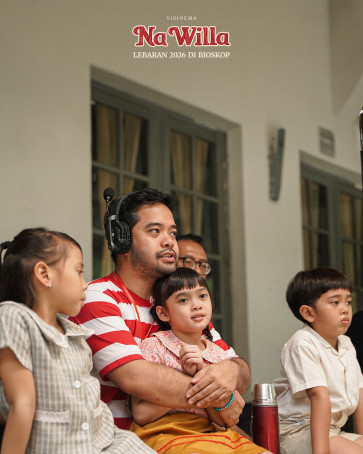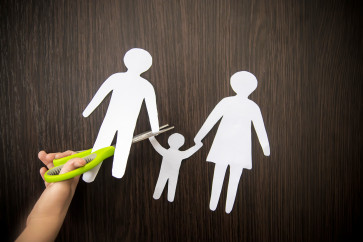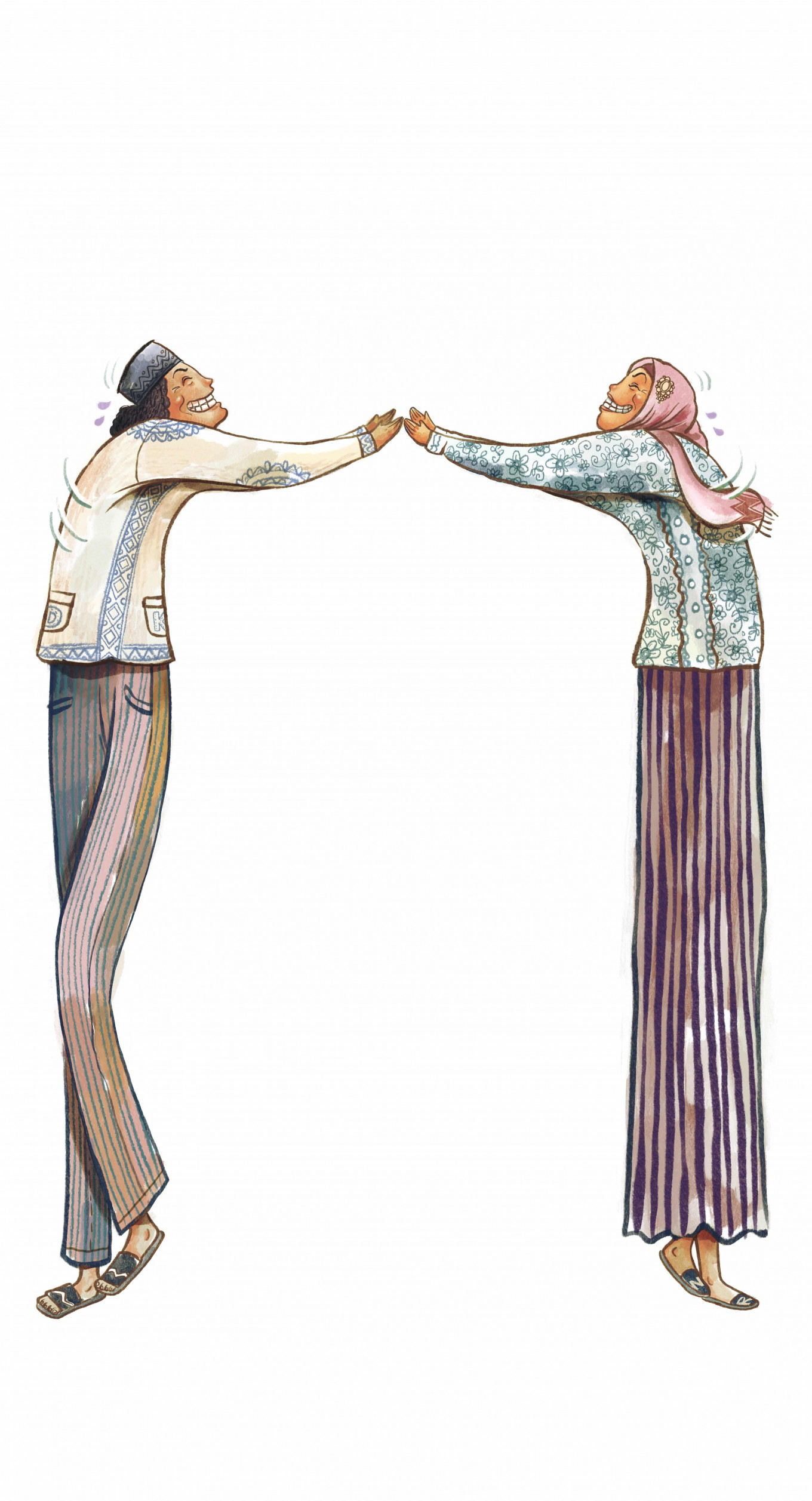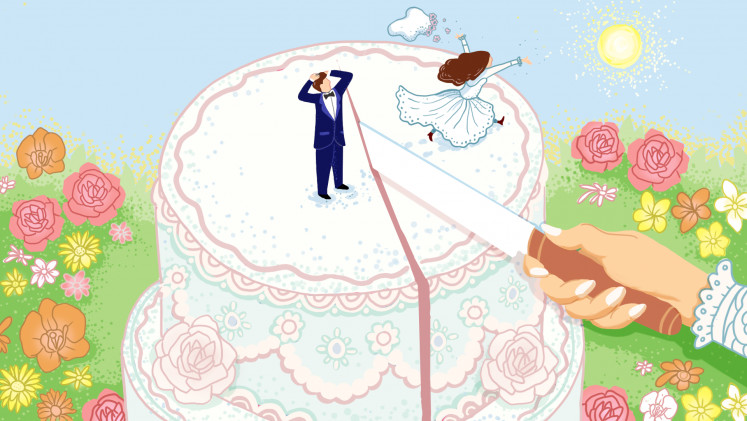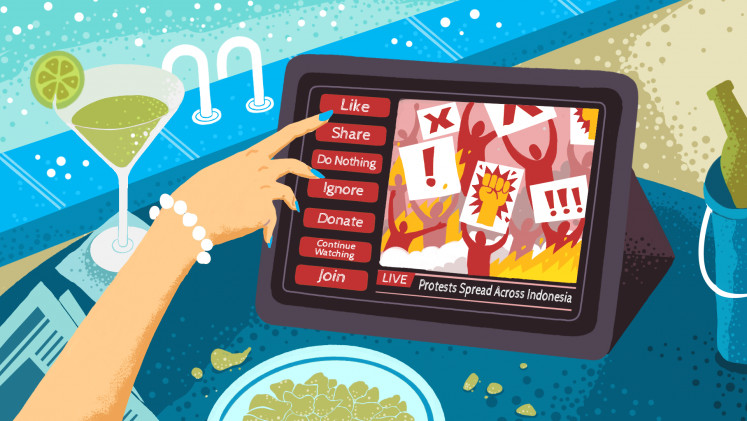“Minal ‘Aidin wal-Faizin. Menyambut Hari Raya Idul Fitri 1446 H, mohon maaf lahir dan batin dari keluarga…” (Minal ‘Aidin wal-Faizin. As we welcome Hari Raya Idul Fitri 1446 H, the family asks for your sincerest forgiveness…)
So goes the WhatsApp message from a distant family friend, jolting me out of my post-THR (holiday bonus) consumerism-driven regret.
Glancing at the message preview from the notification tab, I suspected it was one of those cookie-cutter Idul Fitri templates, passed from one WhatsApp group to another like an artificial intelligence-generated deepfake of the politician du jour.
Though these messages are perhaps well-intentioned, I questioned the sincerity of annually seeking apologies and amnesties, packaged in a fleeting fill-in-the-blanks template blasted to a digital network of family, friends, acquaintances and probably the local greengrocer for good measure.
Or perhaps I was just still seething after realizing for the third time that a gently used Balenciaga did not fix all of my problems.
Still in a daze, I flicked the notification away, where it joined my other 741 unread messages.

Thank you!
For signing up to our newsletter.
Please check your email for your newsletter subscription.
Perhaps she’ll forgive me for that one. There’s always next year.
Obligatory sincerity
Seeking forgiveness for your mistakes and forgiving others for theirs is an essential part of growing as an individual, and something highly encouraged during Idul Fitri. After all, the holiday marks the end of Ramadan, where self-restraint and abstinence are key to attaining an existence closer to the divine.
With that in mind, however, the annual pardoning tradition is perhaps just that: A tradition.
The exact origins of the phrase “Minal ‘Aidin wal-Faizin” (“ مِنَ الْعَائِدِيْن وَالْفَائِزِيْن”, translated approximately as “the returning and the victorious”) is rather disputed.
Some attribute it to a congratulatory phrase from the denizens of Medina following Prophet Muhammad’s triumphant return from the Battle of Badr, while others trace it back to the Andalusian poet Shafiyuddin Al-Hilli.
One thing that’s for sure is that it has little to do with actually asking forgiveness, though perhaps you could make a case for moral victories by showing that you are the bigger person, a return to greatness and all that.
Or at least that’s what the self-help books say.
Like smarmy handshakes from coworkers on the last day before closing the laptop for Lebaran, forgiveness this time of the year can feel like going through the motions just because of expectations to pardon any and all transgressions, no matter how big or small.
“They shouldn’t need a national holiday to make amends if they really mean it, right?” - Emma
A missed email? Mistakes happen. A project nearly imploding? We all have one of those days. Someone not paying you back the Rp 1 million (US$60.75) you spotted them despite near-constant happy-hour cocktails posted on their Instagram stories? Sure, why not?
This is something that 43-year-old Emma (not her real name) fervently believes in, especially at her workplace. Working in the fast-paced, target-centric sales department of a company in Jakarta, she tells me she has seen her fair share of arguments, which were often followed by mutual passive-aggressive behavior.
The thing is, she continues, her coworkers act like everything is resolved after everyone gets back from their holiday break.
“Call me jaded, but their smiles are often the smiles used when buttering up clients,” she said.
“Everyone knows it’s all swept under the rug, but I guess HR doesn’t like infighting and bonuses matter more than feelings.”
All that aside though, can you really forgive them and start over with a clean slate?
Do you even want to?
“God, no. I don’t want to hear another apology if they’re just going to do it all over again the day after. Besides, they shouldn’t need a national holiday to make amends if they really mean it, right?”
A fair point, and one that begs the question: Why do we need an annual collective reset of our boo-boos?
We ask for forgiveness of our faults both intentional and accidental, but how sincere can an apology be when it is demanded? Does the aggrieved even have a say when they are expected to turn the other cheek?
“They’re empty words, a template repeated every year. It’s a lazy phrase because they don’t mean it,” says my old school friend Helen (not her real name) when we meet for coffee that evening.
“Kind of like thanksgiving, but with amnesty instead of gratitude.”
It’s not all doom and gloom, though.
Maybe some do genuinely struggle when it comes to asking for forgiveness, and thus use the moment to forgive and be forgiven, derivative templates be damned.
Others, however, do it out of obligation and the need to do the socially acceptable thing to do. Like liberally sprinkling the prayer hand emoji to make your message sound more sincere. Or, if we’re invoking faith here, starving yourself from dawn to dusk for the optics rather than out of conviction.
Helen concedes that one of the reasons she brushes off any “mohon maaf lahir batin” is perhaps due to the linguistics baggage, like how the phrase’s sheer ubiquity in professional settings conditioned her to disregard any earnest plea for forgiveness.
Certainly food for thought, I suppose, until our conversation was interrupted by another Ramadan template from my phone.
Forgiving for yourself
Writing for The Conversation in 2019, assistant professor of social psychology at Universitas Ciputra, Jony Eko Yulianto, found that the phenomenon of forgiveness in the context of Idul Fitri involves the individual’s social identity, tying the act into their religious conduct.
Studies have concluded that individuals are more likely to forgive others in the same religious community. The stronger their ties to their religion, the more likely they will forgive, even when they might prefer not to.
This sort of relational spirituality is perhaps a vital element in a nation where approximately 87 percent of its 280 million population identifies as Muslim, hence the need for a clean slate to move forward without getting bogged down in old grudges.
Still, that doesn’t make forgiving any easier, does it?
I remember to this day a damp afternoon in 2016, and my incredulity upon hearing that my mother seemingly forgave her former household assistant, who ran off with a loaned Rp 50 million that had somehow turned into a car instead of the promised interest-free payment installments.
“My father once said to me that I deserve to be at peace. If letting go means I will be at peace, then so be it,” my mother said back then.
At the time, I could not understand that decision, mostly because I’m not in the tax bracket that allows me to throw around Rp 50 million willy-nilly. I wasn’t in a place to judge her painfully overprivileged and naive self.
I recently broached the subject again during dinner, but apparently disinterested in bringing up bygones, she offhandedly declared how “the universe will answer” before changing the subject to a TikTok recipe for stir-fried green beans.
It’s certainly interesting to bring the concept of karma into the equation, like how everyone will eventually get their just desserts.
In the former househelp’s case, the grapevine told me of how following the great escape, she then suffered a series of unfortunate incidents that capped off with a divorce. Yet I’ve also personally witnessed numerous other karma houdinis seemingly get off scot-free every time they sow discord.
Thus the question stands: What good is forgiveness if God and the universe are arbitrary in their judgement? What is the point of forgiveness if the wronged are left to pick up the pieces themselves, with only their own faith for comfort, while the world turns regardless?
I struggle with the popular forgive-but-not-forget narrative, because remembering still means living with a festering memento of hate and hurt. Trust is kind of like a mirror—you can fix it if it’s broken, but as Lady Gaga once said to Beyoncé, “You can still see the crack in that [redacted]’s reflection.”
“Thinking about these things means you’ve not truly let the matter go. If I made peace with it, why are you still heated? It’s not even your money to begin with,” my mother muttered.
But it's not even about the money; it’s about the principle. Sure, forgiving and forgetting sounds appealing, but so does plotting revenge. The bottom line is that, in some cases, a clean slate is impossible.
Letting go
Why am I dwelling on my mom’s story, you may ask.
I want to believe that forgiveness earned is not the same as forgiveness imposed, and that the road to amnesty should not be paved with well-intentioned drivel.
Yet it would be folly to expect sincerity out of a template or a public merry-go-round, and thus the cycle of resentment remains unbroken.
At the end of the day, that people would rather hide behind an impersonal wall of text rather than face their shadows is a conscious choice. I can try to understand, but I can’t really say that I approve.
Now, will they forgive me, mind, body and soul for that?
I suppose dwelling on lost money or broken promises does get you nowhere, especially if the apology is forced and ends up rejected anyway. And especially if I’m the one left holding on to a frayed rope while everyone else has sailed away.
Perhaps forgiveness isn’t really about making amends or reparations, but rather removing yourself from enmity and animosity. Perhaps to forgive sincerely is to forget entirely.
So the next time your archnemesis beseeches you to absolve them of all their sins as we approach the end of Ramadan, you’d do well to let go and let God.
Maybe you can even take those dry templates and sycophantic gestures at face value. Who knows, maybe they’ll give you some semblance of liberation amid the eternal samsara of forgiving to be forgiven. I know I would try, at least.
Except for the WhatsApp messages, though. I think they were lost during the periodic purge to clear my phone’s memory at some point.
And if you object to any of the sentiments in this article, well, mohon maaf lahir batin.
Josa Lukman is an editor and head of the Creative Desk at The Jakarta Post. He is also a margarita enthusiast who chases Panadol with Tolak Angin, a hoarder of former "it" bags and an iced latte slurper.





